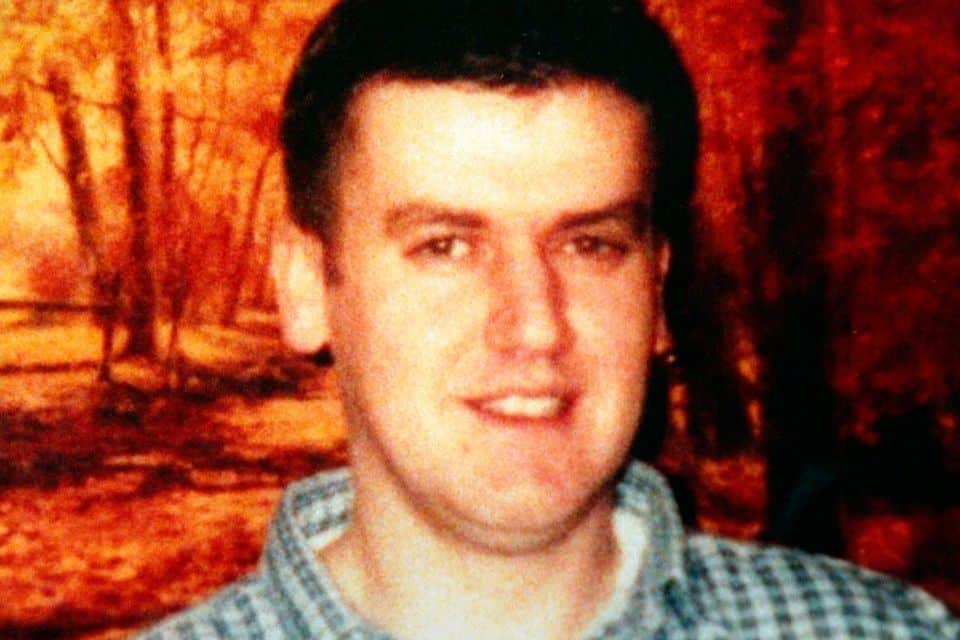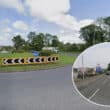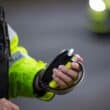
A former RUC officer, who called a murder suspect following a fatal attack in Portadown in 1997, has been branded a “disgrace to the uniform” as he was today sent to prison for a year.
Robert Cecil Atkinson, now 70 and from Brownstown Road in the town, was described by His Honour Judge Patrick Lynch KC as a “criminal” who “continued to serve as a police officer for years afterwards as a criminal”.
In passing sentence, Judge Lynch said Atkinson was a serving police officer and “must have been well aware of the gravity of deliberately misleading investigators into a serious criminal offence which, should it had been discovered, would end his career in the police and may well have ended with a sentence of imprisonment”.
This, the judge contended, was compounded “by engaging others to assist in the cover up with the risks that that entailed, which was ultimately his undoing”.
While the details of that phone call on the morning of Sunday, April 27, 1997 will never be known, the court “can only assume that it had to be a serious matter that he was covering for and that it was in connection to the assault inquiry”.
Judge Lynch also remarked on Atkinson’s move to involve two others in his “elaborate conspiracy” and stated how one of those – Michael McKee – was sentenced to six months in prison, more than 20 years ago, for his role in the cover up.
Said Judge Lynch: “Mr McKee pleaded guilty at the earliest stage and was cooperating with the police….you’ve [Atkinson] never shown such cooperation; even now will not shed light on that fateful phone call.”
Starting tariff for Atkinson’s prison sentence was one of three years, however, given his plea, even at a late stage, reduced that sentence to 27 months. It was further reduced by nine months for a breach of Article 6 of the Human Rights Act in that everyone is entitled to a fair and public hearing within a reasonable time.
Judge Lynch also consider the hardship of an immediate prison sentence given Atkinson’s serious health concerns, thus reducing the overall sentence to 12 months.
BACKGROUND:
At around 1.45am on the morning of Sunday, April 27, 1997 a loyalist mob kicked and punched 25-year-old Robert Hamill and his friend unconscious.
They were walking home from a night out. Tragically, Mr Hamill sustained serious injuries and died on May 8, 1997.
Close to where the assault took place, an RUC Landrover was parked with crew inside.
One of the crew was Reserve Constable Robert Atkinson – and one of the young men present in the vicinity, at the time of the assault, was Allister Hanvey, who was the son of Kenneth Hanvey – both of whom were known to the defendant.
Given the nature of the attack, a police investigation was inevitable, and in due course Alister Hanvey was one of six individuals charged with Mr Hamill’s murder.
In the meantime, police had received information suggesting that Atkinson had made a telephone call tipping off Allister Hanvey in respect of that likely police investigation, and as a result of that information being received, Atkinson was interviewed on September 9, 1997.
He denied making any call to Hanvey. He also denied a subsequent call to the Hanvey household, however, subsequent police inquiries revealed that a telephone call had in fact been made at 8.37am on Sunday, April 27, 1997 – within around eight hours or so of the attack.
That phone call had been made from the defendant’s home, which he shared with his wife, and lasted one minute and 35 seconds.
A further call was made a week later from the Atkinson number, to the Hanvey number, at 4:24pm on May 2, 1997, lasting one minute and one second.
As a result of having that information, police interviewed Atkinson again, this time on October 9, 1997.
His explanation for the call on the morning of April 27, was that that a young couple, Andrea and Michael McKee, were staying overnight at his house and that Michael McKee’s niece was Allister Hanvey’s girlfriend at the time. She was said to have been staying with Hanvey that night.
So, her uncle, Michael McKee, made a telephone call to the Hanvey house to check that she was safe, because he had heard that there had been a commotion in the centre of Portadown that night.
As for the subsequent call on May 2, Atkinson maintained that his wife telephoned Allister Hanvey to discuss matters related to martial arts.
The McKees offered up supporting witness statements to this affect.
However, the McKees’ relationship broke down and in June 2000 Mrs McKee provided a further witness statement.
In it, she admitted that neither she nor her husband, Michael, had in fact been at Atkinson’s home on the night of the attack on Robert Hamill.
She further stated that Robert Atkinson had asked her husband to give a false explanation for the telephone call. She also stated that she and her husband met the Atkinsons to ‘sort the cover story out’ and that Atkinson had devised the false story about Michael McKee inquiring about his niece.
Mrs McKee’s account was supported by the records of a local taxi firm which confirmed that at 1:30am that morning, a call was made from the landline at the McKees’ home address calling for a taxi to take a visitor called ‘Smith’ into Portadown.
In 2002, Michael McKee was given a six month jail term while Andrea McKee was handed a suspended prison term for perverting the course of justice.
Speaking previously, Crown Prosecutor, Toby Hedworth KC, said: “The prosecution cannot say what the purpose of the telephone call was. One has got to contextualise that the call was being made from an officer who was on duty at the time, who would be present at the time of the assault, and was ringing a young man who was going to be a suspect in the assault and who had also been present at the time.
“We have, in the defence submissions, seen nothing to suggest that the content of that call was nothing untoward.”
Judge Patrick Lynch intervened and said: “There is one person who really knows what was said; it’s not me and it’s not you.”
While defence barrister Barry Gibson KC contended that the prosecution cannot say what was talked about in that phone call, he honed in on his client’s health as a reason to suspend any potential prison term.
Mr Gibson drew the judge’s attention to his client’s “long-standing and extensive” cardiac complications which has seen multiple hospital admissions in recent years.
He alluded to medical events which have given rise to speech and memory difficulties, as well as the fact the incident in question occurred 27 years ago.
However, Judge Lynch interjected: “He’s been living with this for 27 years; it seems very improbable that such an event will have been excised from his memory.”
Mr Gibson said Atkinson’s health issues means he is “a ticking timebomb” for possible further strokes and is a man who requires a new pacemaker, all of which he described as “exceptional circumstances”.
Judge Lynch said: “The other exacerbating factor is obviously the fact that he was a serving member of the RUC at the time. That is a substantial aggravating feature.”
Addressing the defence claim on the delay, Mr Hedworth retorted: “There has been significant delay but there has been significant delay because committal proceedings, the first of four sets, began on October 27, 2003.
“They continued to be challenged throughout that time by somebody who knew he was guilty.”
He added: “This court was able to deal with Andrea and Michael McKee in 2002 because, when they were challenged about the matter, they accepted it and were dealt with there and then, so we would submit, it does not lie in his mouth to say ‘well, I should get more lenient treatment, because I have not taken the opportunity to admit my guilt at an early stage and I will now rely upon the delay which I have imparted myself’.”



